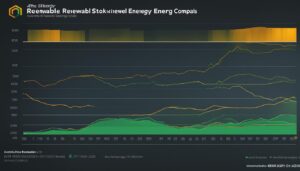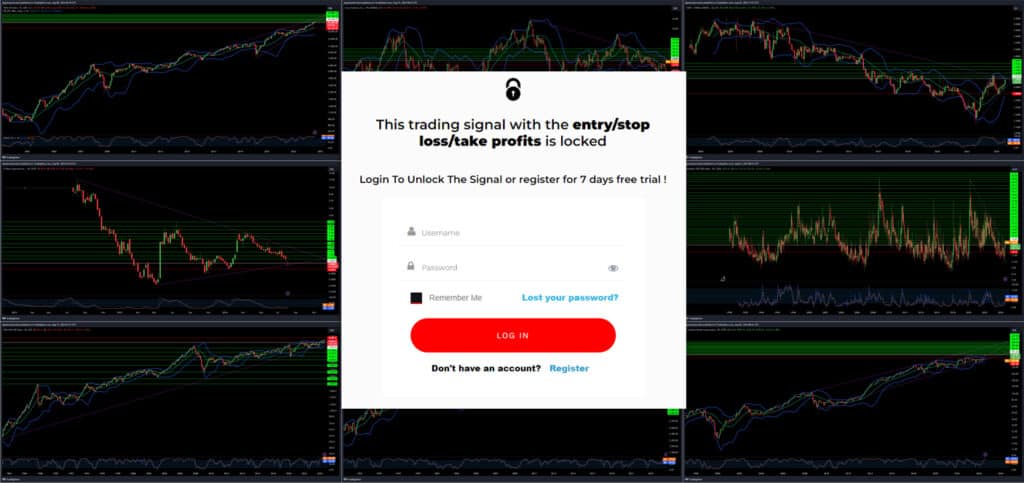As an investor, staying ahead of the curve and identifying emerging trends is crucial for success. In recent years, renewable energy stocks have gained significant traction in the market, driven by global efforts towards sustainability and a shift towards clean energy sources. Investing in renewable energy stocks not only aligns with environmental goals but also presents an opportunity for long-term financial growth.
The future of renewable energy stocks holds immense potential, but it is essential to understand the current investment trends and the factors that influence their performance. In this article, we will explore the impact of inflation on renewable energy stocks, the importance of increased research and development (R&D) funding, and how to maximize returns through strategic investing. Let’s delve into the exciting world of renewable energy stocks and uncover the opportunities that lie ahead.
Key Takeaways:
- Renewable energy stocks offer investment opportunities aligned with global sustainability goals.
- Understanding the impact of inflation and R&D funding is crucial when investing in renewable energy stocks.
- Strategic investing, diversification, and staying informed are key to maximizing returns in this evolving market.
- Volatility, regulatory changes, and technological advancements are risks to consider when investing in renewable energy stocks.
- The future outlook for renewable energy stocks remains positive, driven by the focus on renewable energy sources worldwide.
The Impact of Inflation on Renewable Energy Stocks
The unexpected acceleration of inflation has repercussions on the renewable energy stocks market. While trends towards lower inflation remain intact, the CPI report suggests a more cautious approach to rate cuts. Experts suggest that the Fed’s more patient approach aligns with the lower inflation trend, but market expectations may need to adjust. This has implications for the investment strategy in renewable energy stocks and requires careful consideration.
The Importance of Increased R&D Funding for Renewable Energy
Doubling government funding for agricultural research and development (R&D) has tremendous benefits for the renewable energy sector. The decline in R&D spending poses a threat to agricultural innovation and environmental sustainability. Studies show that increasing R&D funding would be a cost-effective climate mitigation strategy, reducing emissions and land use. Furthermore, it would enhance productivity, farm output, and reduce crop and livestock prices. Policymakers need to prioritize increased R&D funding to capitalize on these investment benefits.
Investment in renewable energy has become crucial in addressing the global challenges of climate change and transitioning to a sustainable future. R&D plays a critical role in driving innovation and technological advancements in the renewable energy sector. By allocating more funding towards research in renewable energy, governments can accelerate the development and deployment of clean energy technologies, creating a positive impact on the environment and society as a whole.
Increased R&D funding offers numerous investment benefits in the renewable energy sector. Firstly, it enables the exploration of new solutions and breakthroughs in renewable energy generation, storage, and efficiency. This leads to the development of more reliable and cost-effective renewable energy technologies, attracting greater investments and driving market growth.
Moreover, increased R&D funding fosters collaboration between researchers, industry experts, and policymakers, creating a conducive environment for knowledge-sharing and innovation. This collaboration results in the creation of new job opportunities and the growth of a skilled workforce in the renewable energy sector.
Furthermore, investing in R&D enhances the competitiveness of renewable energy companies and strengthens the overall industry. Through R&D, renewable energy companies can develop cutting-edge technologies and improve their products, giving them a competitive edge in the market. This not only attracts more investors but also drives down the costs of renewable energy, making it more accessible and affordable for consumers.
Funding Impact on Renewable Energy Innovation
The impact of increased R&D funding can be seen in the innovative solutions and advancements in renewable energy. Take, for example, the development of more efficient solar panels and wind turbines, as well as advancements in energy storage technologies. These advancements have significantly improved the performance and reliability of renewable energy systems, making them more viable alternatives to fossil fuels.
Additionally, increased R&D funding allows for the exploration of alternative sources of renewable energy, such as wave, tidal, and geothermal energy. These emerging technologies have the potential to further diversify the renewable energy mix and contribute to a more sustainable energy future.
Overall, investing in increased R&D funding for renewable energy is crucial for driving innovation, reducing costs, and accelerating the transition to a clean energy economy. Policymakers should recognize the significant benefits of R&D funding and prioritize its allocation to unlock the full potential of renewable energy.
| Benefits of Increased R&D Funding for Renewable Energy |
|---|
| Cost-effective climate mitigation strategy |
| Reduces emissions and land use |
| Enhances productivity and farm output |
| Reduces crop and livestock prices |
| Drives innovation and technological advancements |
| Creates new job opportunities and skilled workforce |
| Strengthens industry competitiveness |
| Improves performance and reliability of renewable energy systems |
| Explores alternative sources of renewable energy |
Forecasting the Future of Renewable Energy Stocks
Looking ahead, the forecast for renewable energy stocks remains positive. Despite the impact of inflation and the need for increased R&D funding, experts project growth in the sector. With a focus on sustainability, renewable energy stocks are poised for long-term success. Investment opportunities in solar, wind, and other sources of renewable energy are expected to continue expanding. It is crucial for investors to stay informed about market trends and take a long-term perspective when considering investments in renewable energy stocks.
Investors looking to capitalize on the future forecast of renewable energy stocks need to stay abreast of market trends and industry developments. Renewable energy sources have gained significant attention due to their environmental benefits and potential for long-term profitability. As governments and businesses around the world shift towards sustainable practices, the demand for renewable energy is expected to grow exponentially.
One key factor driving the positive investment outlook for renewable energy stocks is the global commitment to combat climate change. The Paris Agreement has set ambitious goals to limit global warming and reduce carbon emissions. This has spurred significant investments in renewable energy infrastructure, creating lucrative opportunities for investors.
Additionally, advancements in technology and cost reduction have made renewable energy sources more competitive with traditional fossil fuel-based energy. Solar and wind energy, in particular, have seen substantial growth and are expected to continue their upward trajectory. As the world transitions to cleaner energy alternatives, the demand for renewable energy stocks is projected to increase.
Investors interested in the future forecast of renewable energy stocks should consider diversifying their portfolio and exploring different sub-sectors within the renewable energy industry. This could include investing in companies specializing in solar panel manufacturing, wind turbine production, or energy storage solutions. By spreading investments across various segments, investors can mitigate risks and maximize returns.
Furthermore, staying informed about regulatory changes and government policies related to renewable energy is crucial. Incentives and subsidies provided by governments can significantly impact the profitability of renewable energy companies. Keeping a close eye on these developments can help investors make informed decisions and take advantage of potential opportunities.
In conclusion, the future forecast for renewable energy stocks looks promising. As the world increasingly prioritizes sustainability and transitions to renewable energy sources, investment opportunities in this sector are expected to grow. However, investors must stay informed, diversify their portfolios, and consider long-term perspectives when making investment decisions in renewable energy stocks.
Maximizing Returns through Strategic Investing
When it comes to investing in renewable energy stocks, strategic decision-making plays a crucial role in maximizing returns. As an investor, it is important to consider various factors and adopt a diversified approach to optimize your investment portfolio.
One effective strategy is to include different types of renewable energy stocks in your portfolio, such as solar, wind, and hydro. By diversifying across various sectors within the renewable energy industry, you can potentially mitigate risks and capitalize on multiple growth opportunities.
However, before making any investment decisions, conducting thorough research is paramount. Stay updated on industry trends, policy changes, and technological advancements that may impact the performance of renewable energy stocks. This information will help you identify the most promising investment opportunities and make informed decisions that align with your financial goals.
Engaging with financial advisors who specialize in renewable energy investing can provide valuable insights and guidance. These experts possess in-depth knowledge of the sector and can help you navigate the complexities of the renewable energy stocks market. Their expertise can assist you in identifying high-potential stocks and maximizing your returns.
“Diversification and thorough research are key to maximizing returns in the renewable energy stocks market.”
Benefits of Strategic Investing in Renewable Energy Stocks
By strategically investing in renewable energy stocks, you can unlock several benefits:
- Diversification: By including various types of renewable energy stocks in your portfolio, you can spread out your risk and ensure your investments are not dependent on a single sector.
- Sustainable Growth: Renewable energy is a rapidly growing industry driven by global commitments to combat climate change. Strategic investments allow you to capitalize on this growth potential.
- Long-Term Returns: Investing in renewable energy stocks with a long-term perspective enables you to benefit from the evolving energy landscape and the increasing demand for sustainable solutions.
- Positive Impact: By investing in companies focused on renewable energy, you contribute to a more sustainable future and support the transition to clean energy sources.
Remember, maximizing returns in the renewable energy stocks market requires a well-thought-out investment strategy. By diversifying your portfolio, conducting thorough research, and seeking expert guidance, you can position yourself for success and achieve your financial objectives.
| Strategies for Maximizing Returns in Renewable Energy Stocks | Benefits |
|---|---|
| Diversify your portfolio by including different types of renewable energy stocks | Spread out risk and capitalize on growth opportunities |
| Conduct thorough research on industry trends, policy changes, and technological advancements | Identify high-potential investment opportunities |
| Seek guidance from financial advisors specializing in renewable energy | Gain valuable insights and expertise in the sector |
Risks and Challenges in Renewable Energy Stocks
While renewable energy stocks offer promising investment opportunities, it is crucial to be aware of the risks and challenges in the market. Volatility, regulatory changes, and technological advancements can impact the performance of renewable energy stocks.
Investors should carefully assess the financial health and track record of companies in the sector before making investment decisions. Conducting thorough research can help identify companies with strong fundamentals and a proven track record of success.
Additionally, staying informed about industry trends and developments is essential to mitigate risks and navigate the challenges in the renewable energy stocks market. Monitoring policy changes, technological advancements, and market dynamics can help investors make informed decisions and adapt to changing conditions.
The Risks of Volatility
One of the primary risks in the renewable energy stocks market is volatility. The market can be subject to significant price fluctuations due to factors such as changes in government policies, shifts in public sentiment towards renewable energy, and fluctuations in energy prices.
It is important for investors to understand that renewable energy stocks may experience periods of both rapid growth and decline. This volatility can pose challenges to investors, requiring a long-term perspective and strategic approach to navigate market fluctuations.
Regulatory Changes and Policy Uncertainty
Another challenge in the renewable energy stocks market is the potential impact of regulatory changes and policy uncertainty. Government policies and regulations play a significant role in shaping the renewable energy sector, and changes in these policies can have a profound impact on companies operating in the industry.
Investors should carefully monitor legislation and policy developments that may affect the renewable energy industry. Anticipating and adapting to regulatory changes can help investors assess the potential risks and rewards of investing in renewable energy stocks.
Technological Advancements and Disruptions
Technological advancements and disruptions can also pose risks and challenges in the renewable energy stocks market. The renewable energy industry is evolving rapidly, with new technologies continually emerging. While these advancements present opportunities for growth, they can also lead to market disruptions and changes in competitive dynamics.
Investors should stay informed about emerging technologies and industry trends, evaluating the potential impact on renewable energy stocks. Conducting thorough research and staying updated on technological advancements can help investors identify companies that are well-positioned to capitalize on innovation and navigate potential disruptions.
“Investing in renewable energy stocks requires careful consideration of the risks and challenges present in the market. By thoroughly assessing company fundamentals, monitoring industry developments, and staying updated on regulatory changes, investors can make informed decisions to mitigate risks and maximize the potential return on their investments.”
By understanding and being prepared for the risks and challenges in the renewable energy stocks market, investors can position themselves to capitalize on the opportunities presented by the transition to renewable energy sources. While there are inherent risks, strategic investing, coupled with a long-term perspective, can help mitigate these challenges and unlock the potential for significant returns.
It is important for investors to consult with financial advisors and professionals who specialize in the renewable energy sector to ensure comprehensive analysis and strategic decision-making, optimizing the chances of success in this dynamic market.
Conclusion
In conclusion, investing in renewable energy stocks requires a thorough understanding of market trends and an assessment of the impact of external factors such as inflation and R&D funding. The future outlook for renewable energy stocks remains positive, driven by a global focus on sustainability and renewable energy sources. Despite potential risks and challenges, strategic investing, staying informed, and taking a long-term perspective are key to maximizing returns in this evolving market.
By carefully considering these factors, investors can navigate the changing landscape of renewable energy stocks and capitalize on future investment trends. The renewable energy sector is expected to continue expanding, providing numerous investment opportunities in solar, wind, and other renewable energy sources. Investors should actively monitor market trends, engage with financial advisors specializing in renewable energy, and conduct thorough research to identify the most promising investment opportunities.
As the world shifts towards a greener future, renewable energy stocks are poised for long-term success. With a focus on sustainability and the increasing importance of renewable energy sources, investing in this sector offers not only financial returns but also contributes to a more sustainable and energy-efficient future. By aligning their investments with the growing global demand for renewable energy, investors can play a vital role in driving positive change while maximizing their returns in the process.
FAQ
How does inflation impact the renewable energy stocks market?
The unexpected acceleration of inflation has repercussions on the renewable energy stocks market. While trends towards lower inflation remain intact, the CPI report suggests a more cautious approach to rate cuts. Experts suggest that the Fed’s more patient approach aligns with the lower inflation trend, but market expectations may need to adjust. This has implications for the investment strategy in renewable energy stocks and requires careful consideration.
What are the benefits of increased R&D funding for the renewable energy sector?
Doubling government funding for agricultural research and development (R&D) has tremendous benefits for the renewable energy sector. The decline in R&D spending poses a threat to agricultural innovation and environmental sustainability. Studies show that increasing R&D funding would be a cost-effective climate mitigation strategy, reducing emissions and land use. Furthermore, it would enhance productivity, farm output, and reduce crop and livestock prices. Policymakers need to prioritize increased R&D funding to capitalize on these investment benefits.
What is the future forecast for renewable energy stocks?
Looking ahead, the forecast for renewable energy stocks remains positive. Despite the impact of inflation and the need for increased R&D funding, experts project growth in the sector. With a focus on sustainability, renewable energy stocks are poised for long-term success. Investment opportunities in solar, wind, and other sources of renewable energy are expected to continue expanding. It is crucial for investors to stay informed about market trends and take a long-term perspective when considering investments in renewable energy stocks.
How can investors maximize returns in the renewable energy stocks market?
Strategic investing is essential when it comes to maximizing returns in the renewable energy stocks market. Investors should consider diversifying their portfolio by including different types of renewable energy stocks, such as solar, wind, and hydro. Conducting thorough research, monitoring industry trends, and staying updated on policy changes can help identify the most promising investment opportunities. Engaging with financial advisors who specialize in renewable energy can also provide valuable insights and guidance for maximizing returns.
What are the risks and challenges in the renewable energy stocks market?
While renewable energy stocks offer promising investment opportunities, it is crucial to be aware of the risks and challenges in the market. Volatility, regulatory changes, and technological advancements can impact the performance of renewable energy stocks. Investors should carefully assess the financial health and track record of companies in the sector before making investment decisions. Additionally, staying informed about industry trends and developments can help mitigate risks and navigate the challenges in the renewable energy stocks market.
Source Links
- https://www.kiplinger.com/investing/december-cpi-report-what-the-experts-are-saying-about-inflation
- https://finance.yahoo.com/news/global-molecular-imaging-industry-projected-173000524.html
- https://thebreakthrough.org/issues/food-agriculture-environment/the-case-for-doubling-down-on-agricultural-r-d
Disclaimer
All information on this website is of a general nature. The information is not adapted to conditions that are specific to your person or entity. The information provided can not be considered as personal, professional or legal advice or investment advice to the user.
This website and all information is intended for educational purposes only and does not give financial advice. Signal Mastermind Signals is not a service to provide legal and financial advice; any information provided here is only the personal opinion of the author (not advice or financial advice in any sense, and in the sense of any act, ordinance or law of any country) and must not be used for financial activities. Signal Mastermind Signals does not offer, operate or provide financial, brokerage, commercial or investment services and is not a financial advisor. Rather, Signal Mastermind Signals is an educational site and a platform for exchanging Forex information. Whenever information is disclosed, whether express or implied, about profit or revenue, it is not a guarantee. No method or trading system ensures that it will generate a profit, so always remember that trade can lead to a loss. Trading responsibility, whether resulting in profits or losses, is yours and you must agree not to hold Signal Mastermind Signals or other information providers that are responsible in any way whatsoever. The use of the system means that the user accepts Disclaimer and Terms of Use.
Signal Mastermind Signals is not represented as a registered investment consultant or brokerage dealer nor offers to buy or sell any of the financial instruments mentioned in the service offered.
While Signal Mastermind Signals believes that the content provided is accurate, there are no explicit or implied warranties of accuracy. The information provided is believed to be reliable; Signal Mastermind Signals does not guarantee the accuracy or completeness of the information provided. Third parties refer to Signal Mastermind Signals to provide technology and information if a third party fails, and then there is a risk that the information may be delayed or not delivered at all.
All information and comments contained on this website, including but not limited to, opinions, analyzes, news, prices, research, and general, do not constitute investment advice or an invitation to buy or sell any type of instrument. Signal Mastermind Signals assumes no responsibility for any loss or damage that may result, directly or indirectly, from the use or dependence on such information.
All information contained on this web site is a personal opinion or belief of the author. None of these data is a recommendation or financial advice in any sense, also within the meaning of any commercial act or law. Writers, publishers and affiliates of Signal Mastermind Signals are not responsible for your trading in any way.
The information and opinions contained in the site are provided for information only and for educational reasons, should never be considered as direct or indirect advice to open a trading account and / or invest money in Forex trading with any Forex company . Signal Mastermind Signals assumes no responsibility for any decisions taken by the user to create a merchant account with any of the brokers listed on this website. Anyone who decides to set up a trading account or use the services, free of charge or paid, to any of the Broker companies mentioned on this website, bears full responsibility for their actions.
Any institution that offers a service and is listed on this website, including forex brokers, financial companies and other institutions, is present only for informational purposes. All ratings, ratings, banners, reviews, or other information found for any of the above-mentioned institutions are provided in a strictly objective manner and according to the best possible reflection of the materials on the official website of the company.
Forex/CFD trading is potentially high risk and may not be suitable for all investors. The high level of leverage can work both for and against traders. Before each Forex/CFD investment, you should carefully consider your goals, past experience and risk level. The opinions and data contained on this site should not be considered as suggestions or advice for the sale or purchase of currency or other instruments. Past results do not show or guarantee future results.
Neither Signal Mastermind Signals nor its affiliates ensure the accuracy of the content provided on this Site. You explicitly agree that viewing, visiting or using this website is at your own risk.




